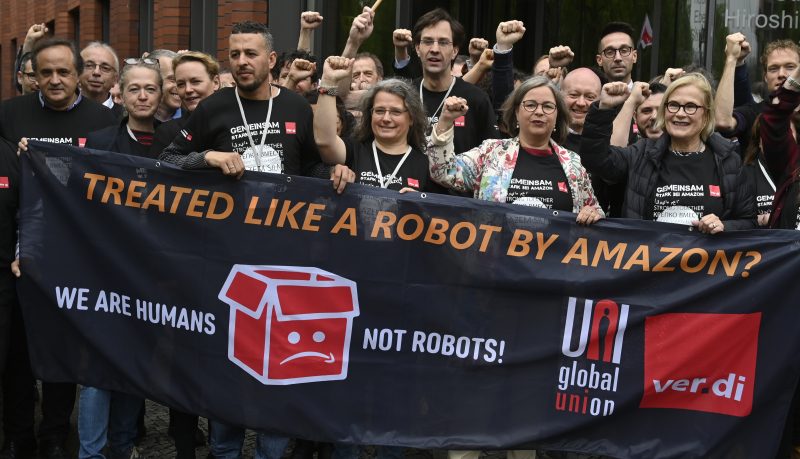Amazon workers from around world join forces in Berlin
More than 50 Amazon employees from as far afield as Egypt, Brazil and Pakistan gathered in Berlin on Monday (JOHN MACDOUGALL)
Berlin (AFP) – Amazon worker representatives from 15 countries met in Berlin on Monday to coordinate their strategy against one of the world’s most powerful companies, after years of individually battling against its often-criticised employment practices.
Alfred Bujara of Amazon Poland proudly showed off images from his latest campaign to a German colleague, urging their employer to “stop the rat race”.
“Conditions are bad around the world, but in Poland they’re worse,” said Bujara, a member of the Solidarnosc union.
Workers’ movements are tracked “down to the second” and “if they can’t cope, then they’re fired,” he complained.
More than 50 representatives from as far afield as Egypt, Brazil and Pakistan, as well as neighbouring Italy, Poland and France, gathered in the German capital in a closed-door summit set to last into Tuesday.
The aim: to compare notes on working conditions in Amazon’s logistics centres around the world, the engine rooms that speed wares from the so-called “everything store” to customers’ homes.
Seattle-based Amazon boasts around 800 such depots worldwide and regularly opens new ones.
– Sharing information –
“We’re sharing information about the different rules and regulations, then we can use those in the negotiations,” Bujara said ahead of a “family photo” in the Berlin rain, fist raised alongside his colleagues from abroad.
“We learn that we’re not alone, that we’re facing some of the same challenges everywhere in the world,” said Christy Hoffman, secretary-general of the international UNI Global Union.
As well as Amazon Logistics’ machine-like demands and fine-grained surveillance of employees, workers complain of low salaries and are demanding collective bargaining agreements, or at least a more orderly form of dialogue with management.
“We reject the allegations raised by the trade union (UNI),” Amazon Germany responded in a statement.
“Amazon proves every day that you can be a fair and responsible employer without a collective bargaining agreement.”
European unions have struggled since 2013 to secure recognition from Amazon bosses, picking key days for online shopping like “Prime Day” or “Black Friday” to throttle package deliveries and draw public attention to their working conditions.
In 2018, industrial action reached a new height as around 50 strikes were organised around Europe and, in a rare show of cross-border solidarity, some were coordinated to hit simultaneously in several countries.
“If we coordinate amongst ourselves, France, Italy, Spain, then Amazon reacts. If there’s a struggle, Amazon agrees to talks,” said Stefanie Nutzenberger of German service workers’ union Verdi.
– First steps –
But the cross-border movement is still in its infancy outside of Europe.
“In South America, we’re in totally unknown territory. They’ve just opened an operations centre in Brazil and the employees there are not at all prepared,” said Henry Oliveira, a union representative from Uruguay.
Many Amazon workers used the social media hashtag #wearenotrobots in November as a rallying cry for their campaign against the giant.
More in-depth exchanges are going on informally and under the company’s radar in private messages, British UNI member Matthew Painter told AFP.
It could be some time before a global strike along the same lines as the Europe-wide actions seen last year.
“That would be hard given how different legislation is across countries,” Painter acknowledged.
Nevertheless, “we’re preparing for other conflicts and they will extend beyond our borders,” German rep Nutzenberger said.
Disclaimer: Validity of the above story is for 7 Days from original date of publishing. Source: AFP.


